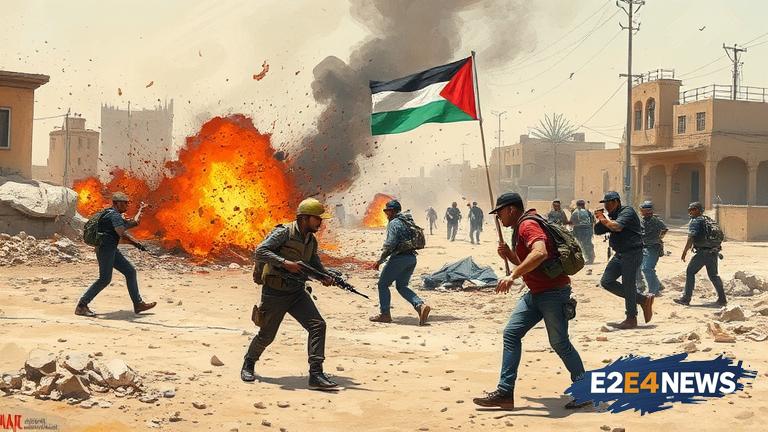The situation in Gaza has taken a turn for the worse as Israel and Hamas have engaged in a series of intense clashes, resulting in significant damage and loss of life. The conflict began when Hamas militants launched a barrage of rockets into Israeli territory, prompting a swift response from the Israeli military. The Israeli Defense Forces (IDF) launched a series of airstrikes against Hamas targets in Gaza, including military outposts and weapons caches. The Gaza Health Ministry has reported that several Palestinians have been killed and injured in the strikes, including civilians. The Israeli government has stated that it will not tolerate the continued aggression from Hamas and will take all necessary measures to protect its citizens. The international community has called for calm and restraint, urging both sides to engage in diplomatic efforts to resolve the conflict peacefully. The United States has expressed its support for Israel’s right to self-defense, while also emphasizing the need for a two-state solution to the Israeli-Palestinian conflict. The European Union has condemned the violence and called for an immediate ceasefire. The conflict in Gaza has been ongoing for decades, with periods of relative calm punctuated by outbreaks of violence. The root causes of the conflict are complex and multifaceted, involving issues of territory, identity, and resources. The Israeli-Palestinian conflict is one of the most enduring and contentious in the world, with both sides having legitimate claims and grievances. The international community has long recognized the need for a two-state solution, with Israel and Palestine living side by side in peace and security. However, achieving this goal has proven to be extremely challenging, with numerous obstacles and setbacks along the way. Despite the difficulties, many remain committed to finding a peaceful resolution to the conflict, recognizing that it is essential for the well-being and prosperity of both Israelis and Palestinians. The current escalation in Gaza is a stark reminder of the urgent need for a lasting solution, one that addresses the underlying issues and provides a framework for a peaceful and stable future. The humanitarian situation in Gaza is also a major concern, with many Palestinians facing significant challenges in terms of access to basic necessities like food, water, and healthcare. The international community has a critical role to play in supporting the people of Gaza and promoting a peaceful resolution to the conflict. As the situation continues to unfold, it is essential that all parties involved prioritize diplomacy and restraint, recognizing that a military solution is unlikely to achieve a lasting peace. The world is watching with bated breath as the crisis in Gaza deepens, hoping that a way can be found to end the violence and promote a more peaceful and stable future for all. The conflict in Gaza is a complex and multifaceted issue, with deep historical roots and a profound impact on the lives of millions of people. It is a reminder that even in the most challenging and contentious conflicts, there is always hope for a better future, one that can be achieved through determination, diplomacy, and a commitment to peace. The international community must continue to support efforts to promote peace and stability in the region, recognizing that a lasting solution to the Israeli-Palestinian conflict is essential for the well-being and prosperity of all. As the situation in Gaza continues to evolve, it is essential that all parties involved remain committed to finding a peaceful resolution, one that addresses the underlying issues and provides a framework for a more stable and secure future. The world is waiting with anticipation to see how the crisis in Gaza will unfold, hoping that a way can be found to end the violence and promote a more peaceful and stable future for all. The conflict in Gaza is a stark reminder of the need for diplomacy and international cooperation, recognizing that a lasting solution to the Israeli-Palestinian conflict is essential for the well-being and prosperity of all. The international community must continue to support efforts to promote peace and stability in the region, recognizing that a military solution is unlikely to achieve a lasting peace. The current escalation in Gaza is a wake-up call for the international community, highlighting the urgent need for a lasting solution to the Israeli-Palestinian conflict. It is a reminder that even in the most challenging and contentious conflicts, there is always hope for a better future, one that can be achieved through determination, diplomacy, and a commitment to peace.





